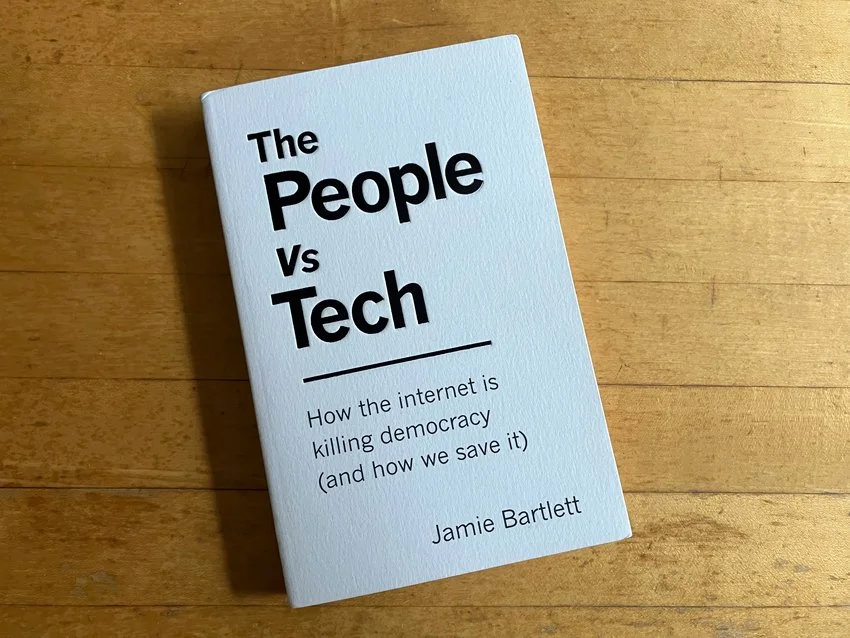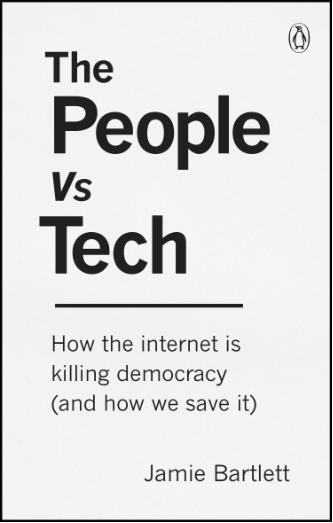Book Review: The People vs. Tech
POWER cuts can have their advantages. Recently, when the electricity to my house failed for a few hours, I had a respite from being ‘plugged in’ to the digital world. My mind rested, and I realized how full of useless energy my brain was when engaged with digital technology. This discovery was personally important but minor compared with the insidious effects of technology on our political world.
In his exploration of how the internet is destroying democracy, Jamie Bartlett, tech blogger for the Spectator and director of the Centre for the Analysis of Social Media at the cross-party think tank Demos, deftly points out the ways that technology is making us political infants, prey to new monopolies and tyrannies. He admits that technology has made us more informed, wealthier and in some ways happier. However, he goes on to point out the six pillars that make democracy work (active independent citizenry capable of moral judgements; a shared culture and a spirit of compromise; free elections; manageable levels of equality; a competitive economy and independent civil society; and a sovereign authority that can enforce the people’s will but remains accountable to them) and shows how digital technology is destroying almost every one of them. Clearly this also has important ramifications for the meeting of individual emotional needs.
The attacks are on several fronts. First of all, our attention is being harvested for profits. Algorithms are developed that monitor us digitally and learn more about us than we know ourselves. The extent of this is quite alarming to discover. The results are then used to influence our behaviour and direct where our attention goes in the future, all in the name of profits.
Second, sophisticated analysis of digital information (analytics) means that every election is now ‘datafied’. Each person can be attended to directly in the digital world. This hyper-personalisation permits politicians to make different promises to different universes of people without cost. A common political culture is replaced by fragmentation as new, sometimes foreign, agencies warp traditional political patterns. For example, Russian bots (automated software programs) post on both sides of the gun control argument in the US, because “if the American people are arguing, the Russian government believes it is winning”.
Third, technology is resulting in an increase in tribalisation. Because opinion in the digital world is unchecked and there is no mitigating framework online, tribal tendencies bred into us in the savannah for useful purposes are encouraged to go rogue, creating hugely malign them-and-us situations. The result is that representative government, with its checks and balances, is mortally weakened.
If that’s not enough, these analytics will also soon go to scale, tapping data everywhere, from our smart fridges to the collars around our pets’ necks. By understanding our environment through this information, big tech can anticipate, even create, our expectations, and so autonomy goes out the window.
Furthermore, as artificial intelligence takes over a range of jobs, a ‘barbell economy’ arises, composed of rich and poor with a withered middle class in between, resulting in a shrinking tax base. The dissatisfied lower side of the barbell experiences mental illness and lower life expectancy, and increased crime rates. Politically, all of this means that a small number of companies, or a government for that matter, can take control over the structure and content of public debate: they set it; we respond. The result is ‘convenience addicts’ who wait to be told what to do politically.
Clearly, autonomy, attention and belonging (to a common culture) – all human givens – are annihilated by this brave new world. In addition, there is the loss of solitude and privacy that the social media world encourages. Ultimately, this new world also affects our need for meaning. Social media is about performance and appearing successful, whereas real learning involves failure and making real life mistakes; tough decisions define us and create our character. It will be difficult to stretch ourselves in a world where there is little risk, where all is decided for us. If we design machines that make smarter and wiser decisions than we do, we somehow become their subordinates. Already decisions that have moral implications, such as teacher evaluations or the distribution of police officers, are being made by machines. The logical endpoint of all this ‘dataism’ is that we each become a unique, predictable and targetable data point. As human givens are damaged, the human being disappears.
Bartlett lists many possible solutions to this problem, from breaking the digital advertising model and information collection by strengthening privacy settings to, interestingly, a robot tax. He also recommends keeping a human contribution to every technological advancement and every decision. We can then remain influencers of our future. Good though they are, his ideas may not be enough. Democracy is ill equipped to handle the problems described; civil protests and a weak independent media are no match for this slow drift towards ‘techno-authoritarianism’.
I speculate that something more revolutionary may be needed, a basic shift of focus from profits and stimulation to putting human beings and their needs and capacities at the centre of politics. This seems like a tall demand, but in some ways nothing could be more plain and simple. As Bartlett himself suggests, there needs to be a shift from an attention economy to one of human value; should society be run by technology or by the people? It is amazing that we even have to ask the question. The most basic obstacle, however, may be our own passivity, and our growing inability to imagine a world without the use of these instruments. As Bartlett concludes, “Many of us won't notice, and those who do mostly won’t care” where we are heading.
It is a great irony that we have managed to spread out from the savannah, build pyramids and complex societies, launch spacecraft and navigate our solar system only to lose our souls to our own technological development. After reading this excellent and highly thought-provoking book, I think I will find myself wishing, and praying, for the next power cut.
This review was written by John Bell and first appeared in the Human Givens Journal, vol. 25, no. 2, 2018.




